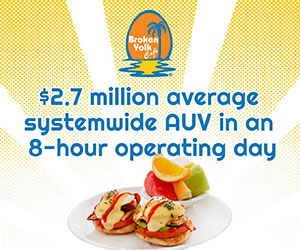Exit Strategies
Many restaurant operators and dealmakers are hoping for a return to the pre-2008 environment, when multiples were robust, liquidity was flowing, equity was prolific, and debt capital was plentiful.
- Dean Zuccarello
- 6,937 Reads 115 Shares
Family and entrepreneur-run businesses face many unique and complex challenges, including succession planning. Generally, family businesses are more than just a place of work; there is emotional as well as financial capital tied up in the business, and passing on the family legacy can be stressful and fraught with difficulty.
- Dean Zuccarello
- 7,334 Reads 107 Shares
Over the past 25 years, franchising has continued to develop and become more sophisticated. The reins of the franchisor have passed from the pioneering founders to established management teams with significant industry experience. Today, many of these companies are publicly traded or majority-owned by institutional equity investors.
- Dean Zuccarello
- 6,020 Reads
As we work our way out of the current recession, we are already starting to see early signs of life in the merger and acquisition market.
- Dean Zuccarello
- 4,695 Reads 69 Shares
Historically, franchising has accepted EBITDA as the benchmark for establishing valuation. However, as seen over the past several years, valuations can vary widely across franchisors, franchisees, and company-owned concepts. Franchising has seen transaction multiples ranging from the low single digits up to lofty double digits. So what is the justification for this wide range in transaction multiples? What makes a buyer willing to pay 8x for one deal, but only 4x for another?
- Dean Zuccarello
- 18,113 Reads 1,834 Shares
Mergers and acquisitions (M&A) have been an instrumental component in franchising over the past two decades, particularly as a growth vehicle for expanding companies. Historically, most transactions in franchising have concentrated more on the "A" than on the "M." Some of the primary drivers for this have been cultural and business trends deeply entrenched within franchising. However, the current global financial crisis and franchising's own changing dynamics may alter this.
- Dean Zuccarello
- 6,275 Reads 1,014 Shares
Since mid-2008, the economy, consumers, and the restaurant industry have been in the vice grip of the country's deepest and longest recession since the Great Depression. Finally, a light at the end of the tunnel is beginning to emerge. Most economists are now saying we have reached or passed the bottom. While the going is certainly still rough, business conditions are beginning to improve, unemployment is stabilizing, and consumers are dipping their toes back in the spending pool. Capital flow is increasing, with equity investors coming off the sidelines and lenders beginning to seriously pursue new debt facilities for borrowers.
- Dean Zuccarello
- 6,220 Reads 361 Shares
Robert came to us to help him develop a 5-year Transition Growth Plan so he could sell his company and retire. He had high expectations for what the sale would net him financially, based on his presumed growth rate. Unfortunately, his presumptions were well beyond business reality. He had never utilized a written strategic growth plan or a business model innovation program. And the stagnant state of affairs which made up his company were proof of this.
- Nicholas K. Niemann and Andrew Horowitz
- 16,270 Reads 1 Shares
Jake was visibly upset when he came to see us. He had been planning to retire in 3 years by age 55, based on the combined value of his personal investments and his company. This was now on hold for an indefinite period of time. Like many, he had suffered a significant hit in the 2008 through 2009 stock market declines. He wanted to visit about the benefits of a comprehensive wealth plan - something he hadn't taken the time to explore in the past.
- Nicholas K. Niemann and Andrew Horowitz
- 6,696 Reads 1,014 Shares
The historical consolidation of franchise finance sources (local and regional banks, and other institutions) has led to only a handful of major players financing franchised companies over the last several years. These institutions, all well-known household names, have dramatically decreased leverage multiples while increasing interest rates and, most importantly, are tightly preserving capital until general economic conditions show signs of stability. As these lenders limit the flow of debt capital to franchising (or shut off lending completely), there are some trends all franchise owners should consider to ensure their financing needs are met during this recession.
- Dean Zuccarello
- 4,550 Reads 60 Shares
Sam and Louie had been in business for about ten years, operating a chain of retail clothing stores. They were 50/50 owners in the corporation. When Sam approached us he had already been working for about 9 months to try to come up with a proposal which Louie would accept for dividing up their operations.
- Nicholas K. Niemann and Andrew Horowitz, CPhD
- 6,151 Reads
Craig had a sales organization which he had built but had just recently suffered a serious setback when he came to us to talk about his Transition Growth Planning. He had helped develop three key employees whom he felt were primed and ready to eventually take over and purchase the business from him. Unfortunately, he had not yet communicated his vision for these employees to the employees themselves. Shortly before he met with us, these three key employees decided that their best future would be to develop a new business on their own. So they left Craig and took their book of business with them. Much of this business had been initially developed by Craig, who had been transitioning his contacts over to these three individuals.
- Andrew D. Horowitz, CPhD, and Nicholas K. Niemann, Esq.
- 5,392 Reads 1,021 Shares
Sam had developed and owned a successful retail operation during his business career. He also tried to be diligent by having what he thought was a sound estate plan executed before he died. He and his wife Sally felt they had everything taken care of. So when Sam died unexpectedly, Sally was dismayed to see the vehement dispute that developed between her two sons as to who would operate the company going forward. Apparently Sam had spoken to both of them about running the company if something happened to him, but he had failed to make this decision. Sally ultimately found her only choice to resolve the dispute was to just sell the business.
- Andrew D. Horowitz, CPhD, and Nicholas K. Niemann, Esq.
- 3,609 Reads 66 Shares
John had come to us with high expectations for the price he thought his company would sell for. He was certain of this because he had seen other companies sell for a similar multiple of gross revenue. However, what John had failed to understand was that buyers are only partly interested in top line revenue. More important to negotiating the selling price of most companies is the net cash flow the company produces. John's bottom line failed to live up to industry standards, which meant he wasn't likely to achieve the exit he had envisioned.
- Andrew D. Horowitz, CPhD, and Nicholas K. Niemann, Esq.
- 4,041 Reads 118 Shares
We weren't surprised by our meeting with Art. We had seen it many times before. Art and his son had founded and built a very successful retail business. They had operations across the country which were consistently producing significant year-to-year net cash flow. Art had decided recently that he was ready to sell the company and that he wanted to get this done right away.
- Andrew D. Horowitz, CPhD, and Nicholas K. Niemann, Esq.
- 3,328 Reads 12 Shares
Business cycles are the norm and while difficult to predict, peaks and valleys in our economy will always occur. However, the speed and magnitude of deterioration in worldwide business conditions and financial markets make the current recession especially severe. As everyone now knows, this is not a normal trough or business cycle; survival and success during these times will require extraordinary actions.
- Dean Zuccarello
- 4,399 Reads 1 Shares
We weren't surprised by our meeting with Art. We had seen it many times before. Art and his son had founded and built a very successful retail business. They had operations across the country which were consistently producing significant year-to-year net cash flow. Art had decided recently that he was ready to sell the Company and that he wanted to get this done right away.
However, as we began to visit, it was obvious Art had some roadblocks in his path that would take some time to overcome. He and his son clearly had significant differences about the future which Art was finding at this late date were becoming more and more difficult to resolve.
- Nicholas K. Niemann, Esq., Andrew Horowitz, CPhD
- 9,111 Reads 12 Shares
When franchise sellers seek exit strategies, they most often look to strategic buyers, other franchisees, their franchisor, or financial investors such as private equity as potential buyers for their businesses.
- Dean Zuccarello
- 3,793 Reads 5 Shares
As a potential seller seeking a liquidity event, will the current credit markets prevent me from finding a buyer/investor at an acceptable valuation multiple? Are potential buyers/investors unwilling to pursue transactions in the present financing and economic environment?
- Dean Zuccarello
- 4,330 Reads 8 Shares
One year ago, the debt markets were flush with cash, the merger and acquisition marketplace was lively with new deal announcements, and operating companies were aggressively pursuing new unit development opportunities. Today, we have a very different story, although an historically recurring one.
- Dean Zuccarello
- 4,265 Reads 1,023 Shares
The numbers are overwhelming: there are more than 12 million businesses in the United States, and over the next five to seven years more than half of these companies will change hands. Of the six million owners who will sell their businesses in the next several years, most will not take specific steps to ensure a smooth transition from their ownership. Even for the few owners who have made an attempt to plan for their exit, their efforts usually fall far short of a comprehensive exit plan.
- Will Lindenmayer
- 3,135 Reads 1 Shares
| Page 2 of 2 | ^ Return to Top | Previous 1 2 |
| ADVERTISE | SPONSORED CONTENT |
FRANCHISE TOPICS
- Multi-Unit Franchising
- Get Started in Franchising
- Franchise Growth
- Franchise Operations
- Open New Units
- Franchise Leadership
- Franchise Marketing
- Technology
- Franchise Law
- Franchise Awards
- Franchise Rankings
- Franchise Trends
- Franchise Development
- Featured Franchise Stories
Subscribe
| ADVERTISE | SPONSORED CONTENT |




 The multi-unit franchise opportunities listed above are not related to or endorsed by Multi-Unit Franchisee or Franchise Update Media Group. We are not engaged in, supporting, or endorsing any specific franchise, business opportunity, company or individual. No statement in this site is to be construed as a recommendation. We encourage prospective franchise buyers to perform extensive due diligence when considering a franchise opportunity.
The multi-unit franchise opportunities listed above are not related to or endorsed by Multi-Unit Franchisee or Franchise Update Media Group. We are not engaged in, supporting, or endorsing any specific franchise, business opportunity, company or individual. No statement in this site is to be construed as a recommendation. We encourage prospective franchise buyers to perform extensive due diligence when considering a franchise opportunity.